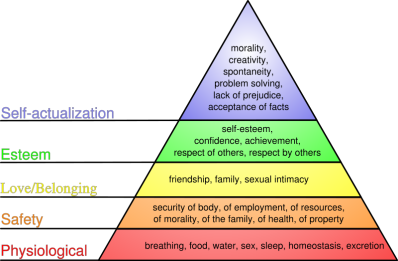Maslow's hierchy of needs is the theory in pyschology that groups any given persons needs into 5 sections, with each group being less and and less primal and more philosophical than the last. The groups are described as: Physiological needs (needs of the body like breathing, eating, sleeping etc.), needs of security (of the body, of family, things of tangable importance to you), needs of love and belongning (of being accepted by those you care about), needs of esteem (self esteem, esteem of others, respect of and by others, etc.) and needs of self actualization (of problem solving, creativity, spontaneity etc.). There was also a sixth group that was described by Abraham Maslowbefore his death in 1970. This group was called self-transcience, watching your children achieve. This was however, never truely adopted into the theory so it will not be dicsussed here. Although it is not explicitly stated, as far as I can tell, it seems as if the most basic needs (the ones near the bottom of the pyramid) must be met before you can satisfy the more complex needs.

Hamlet Killing Claudius
In the play, Claudius has killed Hamlets father and in doing so has jepordized his family's saftey. In this sense Hamlet is killing the person who endangered his family which satisfy his need of safety of family. Hamlet is most likely acting on a violation of his need of love and belonging as well. Since Claudius is his uncle, Hamlet probably feels as if he is being rejected by (a part) of his family, so his killing of his uncle doesnt so much satisfy his need of love and belonging but gets rid of a factor that was endangering it. It could also be argued that Hamlet's whole process of getting to the point where he kills Claudius (writting the mouse trap, not killing him in the confessions etc) is fulfilling his need of self-actualization because of the problem solving aspect, with the problem being that Claudius is still breathing (in the case of not killing him after confessions the problem was that he was going to go to heaven).
Hamlet Killing Laertese
Hamlet doesn't necessarily want to kill Laertese, he is only duelling him because Laertese wants to kill him. In killing Laertese Hamlet is restoring his bodies security, therefore acting on the need of saftey. It could also be argued that he is acting on his need of esteem by making sure that he killed the person who had insulted him and challenged him to a duel.
Hamlet Killing Polonius
Hamlet doesnt even know who he was stabbing and does it in the heat of the moment, without really thinking about it which leads me to believe that he is acting mostly on his pysiological needs (the most primal needs that one doesnt think about).
No comments:
Post a Comment